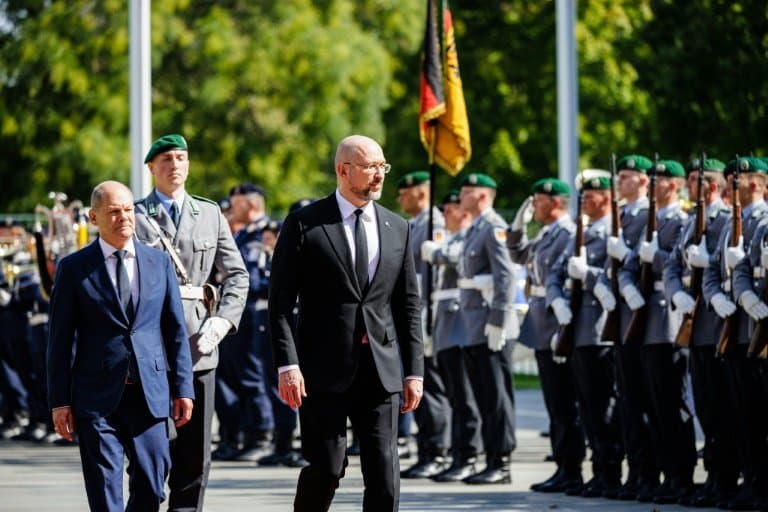Ukraine PM visits Berlin, seeking more weapons

Ukraine’s Prime Minister Denys Shmygal on Sunday voiced hopes that Germany would become a leading player helping Kyiv to build up its air defences, as he sought more heavy weapons for Kyiv from Berlin.
Shmygal is the first high-level Ukrainian official to visit Germany in months, a sign of eased tensions between Kyiv and Berlin after a rocky patch.
Germany’s initial stuttering response on providing military support to Kyiv following Russia’s invasion of Ukraine had sparked consternation.
The air defence system Iris-T is expected to be delivered in the autumn, he said, adding that Ukraine “hopes that Germany will become one of the leaders in the process of developing Ukrainian air defence”.
In a speech on his vision for Europe on Monday, Chancellor Olaf Scholz had said he saw Germany taking on “special responsibility” to help Ukraine build up its artillery and air defence systems.
– ‘Solidarity’ –
Defence ministers of NATO allies are expected to arrive in Germany on Thursday for a meeting led by the United States to coordinate military needs for Ukraine.
Ahead of the talks, Scholz stressed Germany’s commitment to bolstering Ukraine, but added that it would be done in coordination with “our friends and allies”.
The Ukrainian prime minister had made the first stop on his trip to Berlin a meeting with President Frank-Walter Steinmeier, where Shmygal said he “discussed the military situation, strengthening sanctions and the need to provide weapons for Ukraine”.
Shmygal also thanked Germany “for solidarity with Ukrainians and support”.
Germany will “continue to stand reliably by Ukraine’s side,” Steinmeier reassured Shmygal, according to the German president’s spokeswoman.
The cordial read-outs of their talks marked a clear change in tone from previous months, when a row had erupted in April because Steinmeier’s offer to visit Ukraine was rebuffed.
Steinmeier, a former foreign minister from Scholz’s Social Democratic Party, had been shunned over his years-long detente policy towards Moscow — something which he has admitted was a mistake following the outbreak of war.
– ‘Hybrid war’ –
Germany’s SPD has historically championed close ties with Russia, born out of the “Ostpolitik” policy of rapprochement and dialogue with the then Soviet Union, devised by former SPD chancellor Willy Brandt in the 1970s.
That tradition contributed to Germany initially refusing any weapons deliveries to Kyiv, with a previous decision to send only 5,000 helmets sparking anger and mockery.
But Scholz’s coalition, which also includes the Greens and liberal FDP, has since made a sharp U-turn.
Howitzers, rocket launchers and anti-aircraft missiles are among the weapons that have arrived in Kyiv.
Heavier weapons like the IRIS-T anti-aircraft systems, rocket launchers mounted on pick-ups and anti-drone equipment are due in a further military aid package worth over 500 million euros.
Ukrainian soldiers are currently being trained in Germany to use the anti-aircraft Leopard tanks.
On Sunday, former Russian president Dmitry Medvedev accused Germany of leading a “hybrid war” against Russia, justifying a stop in gas deliveries via the Nord Stream 1 pipeline to Europe.
“Firstly, Germany is an unfriendly country. Secondly, it has imposed sanctions against all of the Russian economy… and it is delivering lethal arms to Ukraine,” Medvedev said in support of his statement in a message published on Telegram.
The EU should “completely abandon” Russian energy, Shmygal said in a post on Telegram after his meeting with Scholz, adding that Moscow had “unleashed an energy war against Europe”.
“There is already a decision on the embargo on Russian coal and oil, but an embargo on gas is also needed,” he said, a day before he is due in Brussels where he will join the EU’s chief diplomat Josep Borrell at a meeting of the EU-Ukraine Association Council.





